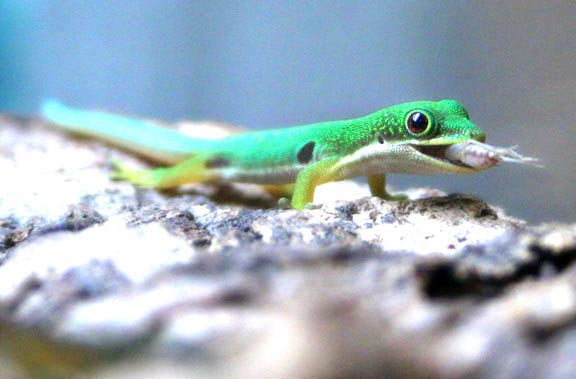
Phelsuma
Overview
Phelsuma is a genus of day geckos native to Madagascar and other islands in the western Indian Ocean, including the Seychelles, Comoros, and Mauritius. These reptiles are known for their vibrant coloration, diurnal habits, and arboreal lifestyle. Their vivid greens, blues, and reds make them popular in herpetoculture.
Identification
Members of the genus Phelsuma are typically small to medium-sized geckos with smooth skin and bright, glossy colors. Most have green bodies with contrasting patterns, such as red or blue spots and stripes. Unlike many other geckos, they are active during the day and have round pupils and sticky toe pads that allow them to climb smooth vertical surfaces.
Distribution and Habitat
Phelsuma species are primarily found in Madagascar, but they also occur on surrounding islands and have been introduced to other regions, including parts of Florida and Hawaii. They inhabit tropical and subtropical environments, ranging from rainforests to coconut plantations and even urban gardens.
Behavior and Diet
These geckos are diurnal and spend most of their time in trees or shrubs. They are omnivorous, feeding on insects, nectar, pollen, and soft fruits. Their attraction to sweet substances contributes to their role as occasional pollinators, particularly in ecosystems where they visit flowers for nectar.
Reproduction
Phelsuma geckos are oviparous, with females laying one or two eggs at a time. The eggs are often glued to leaves or hidden in crevices. Incubation lasts several weeks, depending on the species and temperature. Some species exhibit strong territorial behavior, especially among males.
Ecological Role
By feeding on insects, nectar, and fruit, Phelsuma species help regulate arthropod populations and may aid in pollination and seed dispersal. Their interactions with flowering plants are ecologically significant, especially in island habitats with limited pollinator diversity.
Conservation
Habitat loss and the pet trade pose threats to several Phelsuma species, particularly those with restricted ranges. While some are common and adapt well to human-modified environments, others are considered vulnerable or endangered. Conservation strategies include habitat protection, captive breeding, and education about the ecological value of these colorful lizards.
